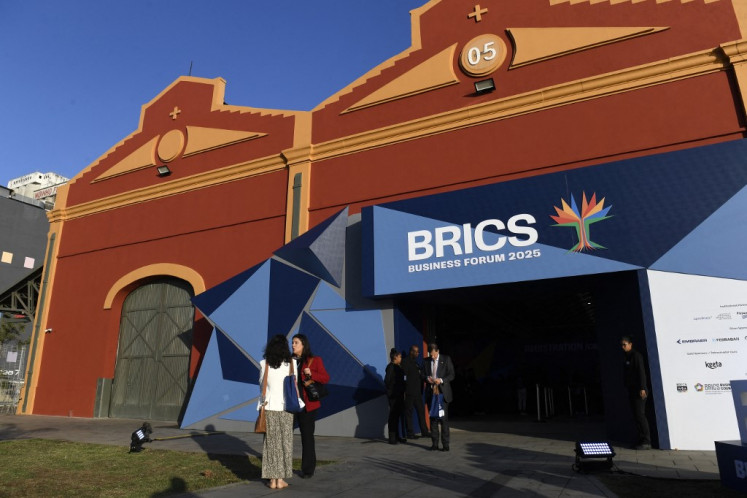Popular Reads
Top Results
Can't find what you're looking for?
View all search resultsPopular Reads
Top Results
Can't find what you're looking for?
View all search resultsN. Korea agrees to resume six-party talks
North Korea has told Indonesia it agreed to resume the six-party talks in a bid to solve the Korean peninsula’s most pressing issues, including increased tension between the two bellicose neighbors and the nuclear disarmament of the North
Change text size
Gift Premium Articles
to Anyone
N
orth Korea has told Indonesia it agreed to resume the six-party talks in a bid to solve the Korean peninsula’s most pressing issues, including increased tension between the two bellicose neighbors and the nuclear disarmament of the North.
Peninsula talks: Indonesian Foreign Minister Marty Natalegawa (left) greets his North Korean counterpart, Pak Ui-chun, for bilateral talks at Marty’s office in Jakarta on Monday. The two discussed rising political tensions in the Korean Peninsula. JP/Wendra Ajistyatama
“One point I would like to emphasize is that we were united under the common view that our countries intend to focus on the pursuit of economic development.
“In this connection, both countries, especially the DPRK [Democratic People’s Republic of Korea], have emphasized the importance of creating conditions conducive for stability in the region,” Indonesian Foreign Minister Marty Natalegawa said Monday.
He spoke to reporters at a press conference after a bilateral meeting with visiting North Korean Foreign Minister Pak Ui-chun.
Marty said Indonesia’s unique position enabled it to help create a situation conducive toward the resumption of the six-party talks — the only way to resolve issues on the Korean peninsula.
Jakarta has a longer diplomatic history with North Korea than with their southern neighbor, although Jakarta and Seoul boast much stronger trade and investment ties.
Indonesia’s diplomatic relations with the North were established in 1963, a decade before ties with South Korea in 1973.
“There is no other process [available]. Indonesia’s contribution is not to create a new track [of dialogue], but to push and urge North Korea to return to the table in the six-party talks,” Marty said.
“I heard from the DPRK’s side, their willingness to return to the talks, however, there must be a sense of parity in the negotiations.”
Parity, he said, was defined as the sense of being treated with respect for the North’s sovereignty and respect for its territorial integrity, as stipulated in a six-party talks declaration in September 2005.
“This is actually a universal known, and no countries can conduct business or diplomacy on the premise of not respecting one another’s sovereignty,” said Marty.
But the talks, which Marty said should start immediately, might be daunted by distrust on the part of many parties that “even a matter as primary and as basic as sovereignty may need to be put at ease,” he said.
The six-party talks, which brings Japan, South Korea, China, the US and Russia into discussion with North Korea over its nuclear disarmament, are expected to bring the issue of the sinking of a South Korean naval vessel to the table as well.
The six-party talks have been in stalemate for the past two years and the sinking of the Cheonan raised concerns that negotiations would be put on hold even longer.
North Korea has shunned a joint report blaming Pyongyang for the sinking that killed 46 South Korean sailors. Two Indonesians also died after their vessel sank in a separate accident while rescuing the Cheonan victims.
The US, Japan and many parts of the world have strongly condemned North Korea for allegedly torpedoing the Cheonan, while China and Indonesia denounced the attack but stopped short of directly blaming the pariah state.
Jakarta said “it condemned such a heinous act and those responsible must be held fully accountable”.
North Korea’s lone ally, China, has been pushing for the resumption of six-party talks while South Korea has given priority to the settlement of Cheonan through the UN Security Council.
South Korea has said that it did not expect the Security Council to slap North Korea with sanctions, but wants Pyongyang to take responsibility for the incident.
Meanwhile, the US and its allies have been engaged in month-long military drills in an apparent show of strength and solidarity to send a message to North Korea.
Apart from South Korea and the US, participating countries include Australia, Canada, Chile, France, Indonesia, Japan, Malaysia, the Netherlands, Singapore and Thailand.










